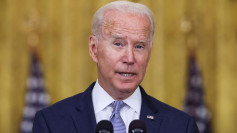President Trump and Colombia reached a critical agreement Sunday to resume migrant deportation flights on US military aircraft, averting a trade war. The deal halts Trump's threatened tariffs and sanctions, solidifying cooperation between the two nations.
After the White House announced that Colombia had agreed to accept military planes transporting deported migrants, the two countries backed off from a trade war on Sunday.
As part of his massive immigration crackdown, U.S. President Donald Trump had previously threatened tariffs and sanctions on Colombia for its refusal to accept military planes transporting deportees.
However, the White House announced late Sunday that Washington would not enforce its promised penalties since Colombia had agreed to receive the migrants.
It confirmed that Colombia's government has consented to all of President Trump's demands, including the immediate and unconditional release of any Colombian nationals detained for illegal immigration who have returned to their home country via whatever means, including U.S. military planes.
Unless Colombia violates this agreement, the draught orders sanctioning and taxing Colombia will remain unsigned.
"Today's events make clear to the world that America is respected again. President Trump ... expects all other nations of the world to fully cooperate in accepting the deportation of their citizens illegally present in the United States," the White House statement advised.
After breaking the stalemate with the United States government, Colombia's foreign minister, Luis Gilberto Murillo, announced the news late Sunday.
"The government of Colombia ... has the presidential plane ready to facilitate the return of Colombians who were going to arrive in the country this morning on deportation flights."
While the message refrained from directly stating that military planes were part of the deal, it also refrained from contradicting the announcement made by the White House.
The Colombian statement went on to say that in the next days, both Murillo and Colombia's ambassador to the US will visit Washington to continue working on the accords that prompted the two nations to exchange diplomatic notes.
Among the currently-on-hold actions proposed by Washington are the following: immediate treasury, banking, and financial sanctions; a travel ban and visa revocations for Colombian government officials; and tariffs on all commodities entering the U.S. from Colombia set at 25%, with the threat of increasing to 50% in one week.
The president has also hinted at stricter border checks for Colombian citizens and goods. Just before the flights were announced, a representative from the State Department announced that the US has temporarily halted the processing of visas at the US embassy in Bogota.
Among Latin American trading partners, Colombia is third for the United States.
U.S. Census Bureau statistics shows that in 2023, the two countries' commerce was $33.8 billion, with a trade surplus of $1.6 billion in the United States. This was mostly because of a free trade agreement that was signed in 2006.
A third of Colombia's exports-or almost 4% of its GDP-rely on access to the U.S. market, according to Alejo Czerwonko, chief investment officer for emerging markets Americas at UBS Global Wealth Management.
Preceding his earlier condemnation of the military deportation flights, Colombian President Gustavo Petro vowed never to conduct a raid to repatriate incapacitated Americans to the United States.
In a post on the social media platform X, he stated that they are the antithesis of the Nazis.
But he did offer his presidential plane to help deportees make a "dignified homecoming" and claimed that Colombia would accept them on civilian airlines.
Since becoming office last Monday, Trump has announced a crackdown on illegal immigration and proclaimed it a national emergency.
He banned asylum in its broadest sense, ordered the United States military to assist with border security, and limited the ability of children born in the United States to become citizens.
Deportation flights conducted by U.S. military planes are highly unusual. Two flights, each carrying around 80 migrants, were conducted by U.S. military planes to Guatemala on Friday.
A U.S. military plane carrying migrants was also denied landing permission by Mexico last week.
In an effort to take more measures against the influx of illegal immigration and fentanyl into the United States, Trump has stated that he is considering implementing 25% tariffs on imports from Mexico and Canada on February 1.
The "degrading treatment" of Brazilians by migrants who were handcuffed on a commercial deportation flight was denounced on Saturday by Brazil's foreign ministry. Some passengers reportedly complained of abuse on the trip when they arrived, according to press sources.
It was originally planned for the jet to land in Belo Horizonte in the southeast state of Minas Gerais, with 88 Brazilian passengers, 16 U.S. security agents, and eight crew members on board.
On Saturday, the Brazilian government announced that during an unplanned stop in Manaus, the capital of Amazonas, officials ordered the removal of the handcuffs. President Luiz Inácio Lula da Silva had already designated a Brazilian Air Force (FAB) flight to finish their journey.
The commercial charter flight was the first since Trump's inauguration and the second this year from the United States to transport deported undocumented migrants back to Brazil, according to Brazil's federal police.
Requests for comment regarding Brazil were not responded to by U.S. officials.






